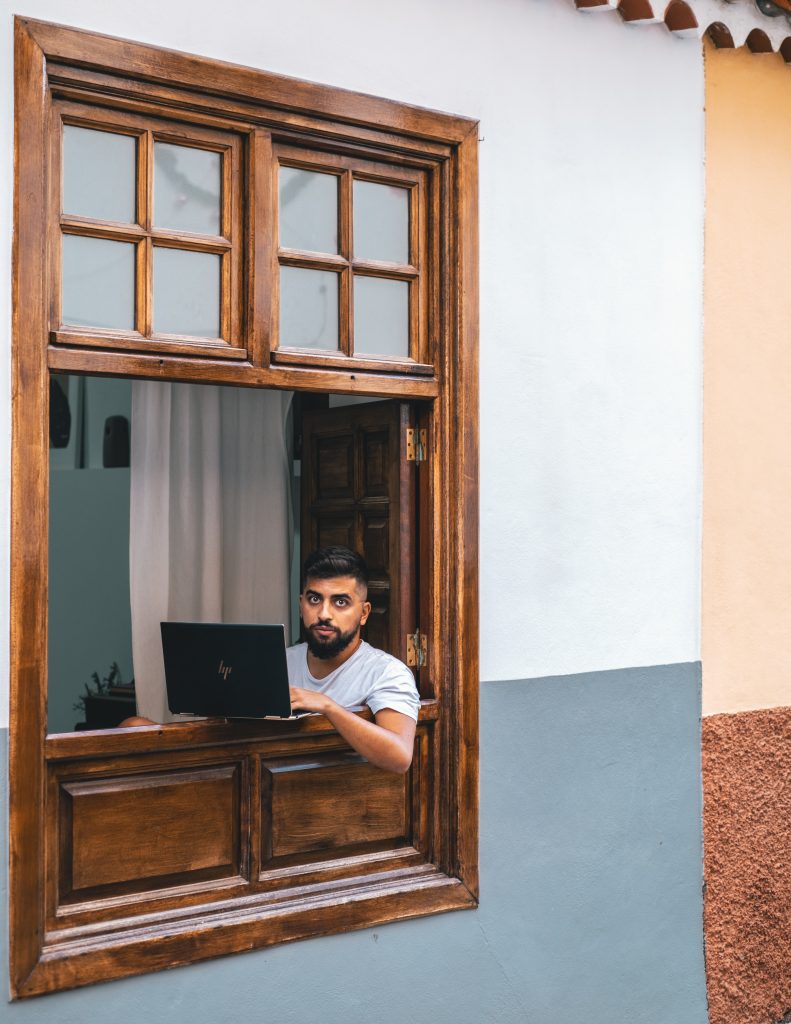[The guide is updated to Spring 2023.]
Update 2023: In the period between the beginning of 2021 and 2023, prices in the Canary Islands, especially those related to tourism have varied between 20% and 50%. Keep this in mind when you read the article. Enjoy your reading!
One of the few positive legacies that this COVID has left/will leave us, in my opinion, is the spread and development of remote working or smart working as it is known. There is no longer any need to go to the office, nor to live in a cold city. The cities are becoming depopulated and many people have become digital nomads, moving to warmer destinations. In the end, all you need to work is a good internet connection, right? That’s why the Wild Working project was born to change the classic concept of “smart working” by offering advice and itineraries on the destinations of the future. Destinations that will allow you to work remotely and, in your free time, to explore your surroundings and experience the adventures as a true local. First destination? The Canary Islands. Here is a short guide to Wild Working: SmartWorking 2.0 in the Canary Islands.
Wild Working: Guide to SmartWorking 2.0 in the Canary Islands
- Which Island?
- How to find accommodation?
- Cost of living
- Internet & Car Hire
- Covid-19 Regulamentation
Smart Working in the Canary Islands: Which island to choose?

The Canary Islands archipelago is a group of 7 islands belonging to the Spanish territory and therefore de facto within the European Union, although geographically located in Africa. There are 4 main islands:
- Tenerife: the largest island and certainly the one that has the most to offer both in terms of local culture and life as well as in terms of landscape. In fact, here is located the highest mountain/volcano in Spain: the Teide. But that’s not all, Tenerife alternates picturesque seaside villages with ‘high mountain’ towns at more than 2000 metres above sea level, all of them smart working ready. Here, the internet connection is more than good enough all over the island for smart working, being almost entirely covered by fibre and 4G+ signals. It is ideal for those who are looking for interesting post-work activities, such as trekking and hiking (also quite challenging) but especially for those who want to really live like the local people. My two favourite cities: Puerto de la Cruz, El Medano. Local Wild Workers
- Gran Canaria: for years now, Gran Canaria has been one of the biggest hotspots for Digital Nomads in Europe and worldwide. In fact, one of the first communities of remote workers has settled here thanks to the very favourable climate and the presence of facilities such as coworking and coliving and very efficient connections. Among others, Gran Canaria is also the most multi-cultural island in the Canary Islands thanks to the very high presence of expats and tourists who now live here. The island is relatively small and easy to explore, and also offers a good deal of hiking. It is ideal for those who are looking for a more international environment or are new to the world of Digital Nomads and want to combine the benefits of the Canarian climate with the international networking activities typical of Digital Nomads. International Wild Workers
- Fuerteventura: Beautiful beaches and deserts. Fuerteventura is definitely one of the most beautiful islands in the Canary Islands thanks to its beautiful beaches and oceanic landscapes. Unlike the other two islands, Fuerteventura does not have any big cities but almost exclusively small villages and towns. Not all parts of the island have a good connection, but it is the ideal destination for those who want to relax away from the city in a villa with a swimming pool, or near one of the beautiful beaches and enjoy great surfing spots. The best smart working towns in Fuerte are: Corralejo, Lajares, el Cotillo. Surfer Wild Worker
- Lanzarote: the island of Lanzarote is one of the “hardest and rawest” of the Canary Islands. It is a completely volcanic island, disseminated of beautiful volcanic craters, that offers lunar landscapes and a very low population density per km. Also here there is no shortage of good beaches and a couple of small towns to use as a base. The connection is good for working. Ideal for those looking for relaxation and solitude to recharge their batteries while working remotely. Wild – Wild Worker
As you may have noticed, there are three islands missing from the list, Palma, El Hierro and la Gomera, which are the three smallest islands in the archipelago but also the most remote/difficult to access, even they are incredibly beautiful, they do not always offer a quality of connection and services to be considered for Wild Working activities.
How to find accommodation?

Whether it’s a villa with your own pool or a shared flat with other workers, finding a house/room in the Canary Islands is quite easy. “Due to the lack of tourists”, many hotels in the main destinations have remained almost empty and therefore the prices you can find online are very competitive. However, it is very important to be clear about the length of time you intend to stay so that you can search in the right place. One of the most common types of accommodation that you will find is a small studio in a residence or holiday complex with a shared swimming pool. Prices for this type of accommodation are around €500-600/month all-inclusive(bills and utilities). It is possible to find other solutions such as whole houses and villas to rent and then share with other flatmates or co-workers. P.S. Always ask for a screenshot of the internet speed test to make sure you have fast internet. Here’s where to look for your home:
- Booking.com: great if you’re looking for a house for 7 days or less. You’ll find many hotel or guesthouse rooms at very affordable prices.
- Airbnb: 7 to 30 days. One tip here is to book and then make a private agreement with the host to get cheaper rates for longer stays.
- FB groups: if you want to stay a few months in the Canary Islands, it is better to start your research from the various FB groups of Digital Nomads living in the various islands, here you can find active communities that will give you tips/contacts for houses. Watch out for SCAMs. Examples: Rentals in Tenerife (In Spanish); Digital Nomads Gran Canaria; Digital Nomads Fuerteventura and so on…
- Milanuncios: Here you will find a wide range of ads, from shared flats to studios. There is a wide range on offer and you will be able to deal directly with the owners!
Cost of living & Smart Working in the Canaries
The cost of living in the Canary Islands is lower than in Western European Countries (but also compared to the rest of Spain), especially if you take cities like Milan, Paris, London or Brussels as a reference. Among the areas in which you save the most, there are certainly transport (with a very low cost of petrol) and supermarkets. The nightlife is also considerably cheaper than in Europe. The average price of rent is 500€ for a studio apartment (see above), while for dinner/dining in a restaurant you can spend from 10€ to 30€ depending on the restaurant. While the cañas or jarras of beer are between €1 and €3.
Smart Working essential services: internet and car rental
Internet
In order to approach Smart Working (Wild Working) in the Canary Islands, there are some services that are essential. First of all, you need to have an Internet connection. Before leaving, check how many GB abroad your rate plan includes and if it is not enough (it is always good to have 10GB backup in case you will need a hotspot) you can easily buy a Spanish sim (or esim if you use a last generation device). Tariff plans in Spain are not very expensive, 10-20GB can be found for about 15€. The main companies are Orange, Vodafone and Movistar and some low-cost operators like Yoigo. As the offers are constantly being updated, just wander around the operators’ shops and ask for the cheapest “prepago” fares.
Car Hire
[2022 Update: Car Rental prices have increased of an average of 30%, rather than the one in the guide]
Another essential service especially if you are interested in getting out and fully explore the islands is car rental. Within the various islands, you can find all the major car hire companies, but also some local ones. For short/long term rentals I’ve found a good deal with AutoReisen (booking directly from their website) bringing home 3-4 day rentals for less than 50€ (including full insurance) or with Cicar who have a one week offer for 99€ (also including full insurance). For long-term rentals only, I was recommended the company PlusCar, which offers monthly rates of 200-250€ (never tried it myself).

Covid Rules and Restrictions (updated Spring 2023)
As of today, Spring 2022, access to the Canary Islands for tourism is permitted. Everything seems to be back to normal!






Pingback: Come diventare un Nomade Digitale? La guida definitiva - The Sustainable Tour